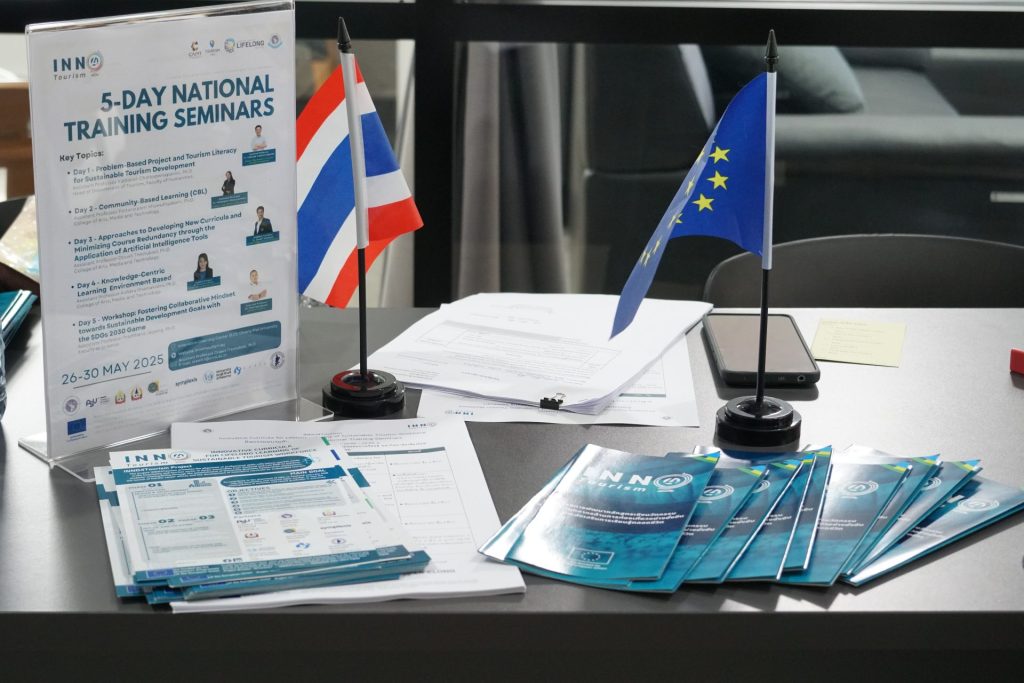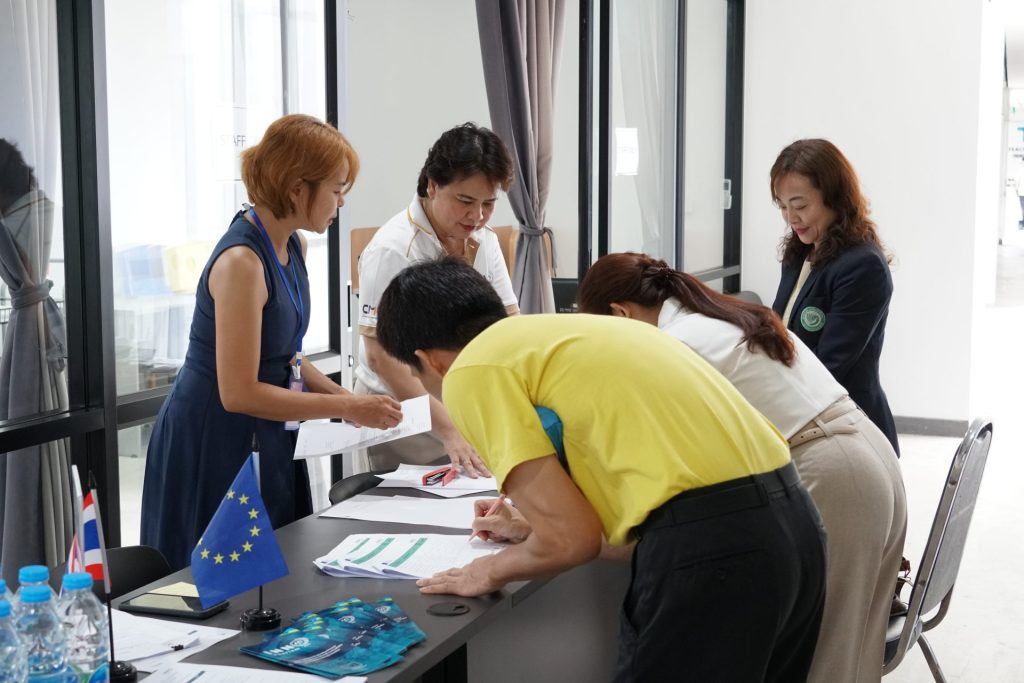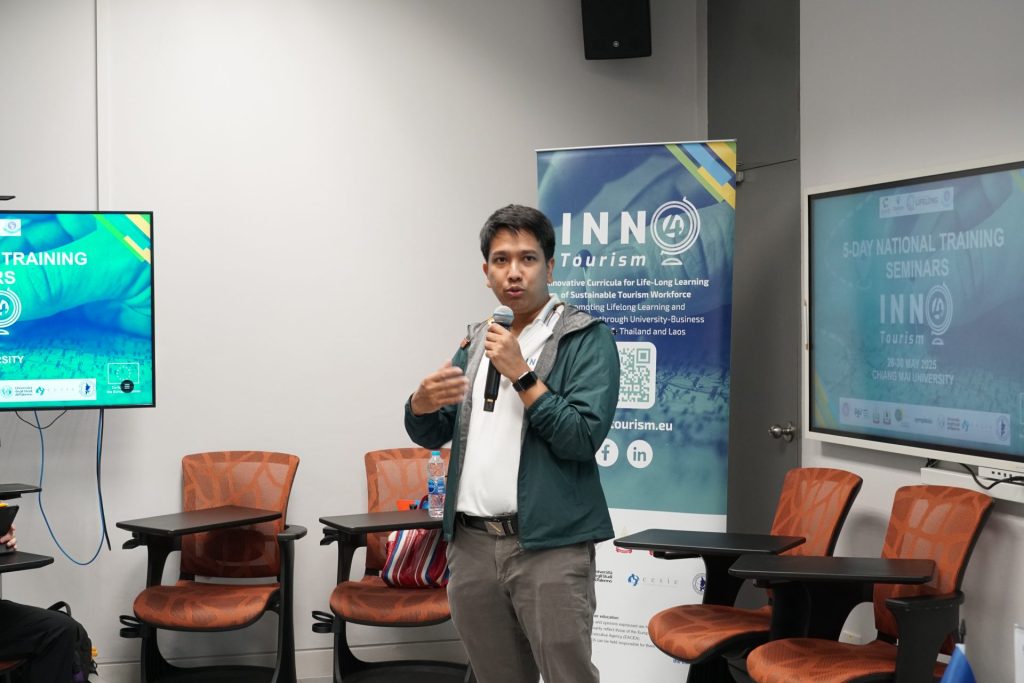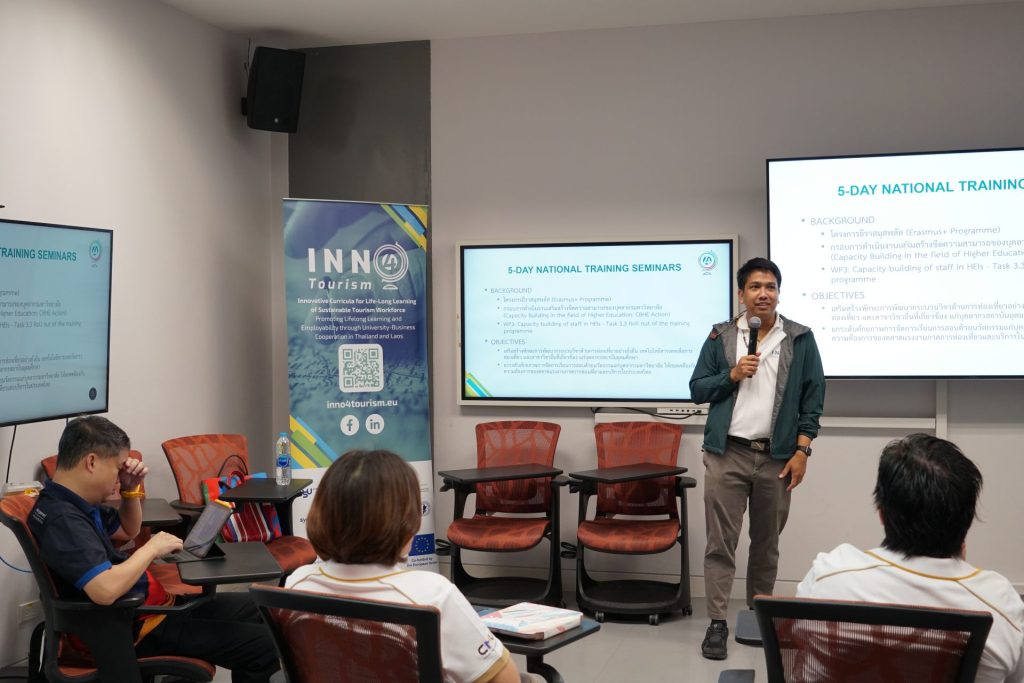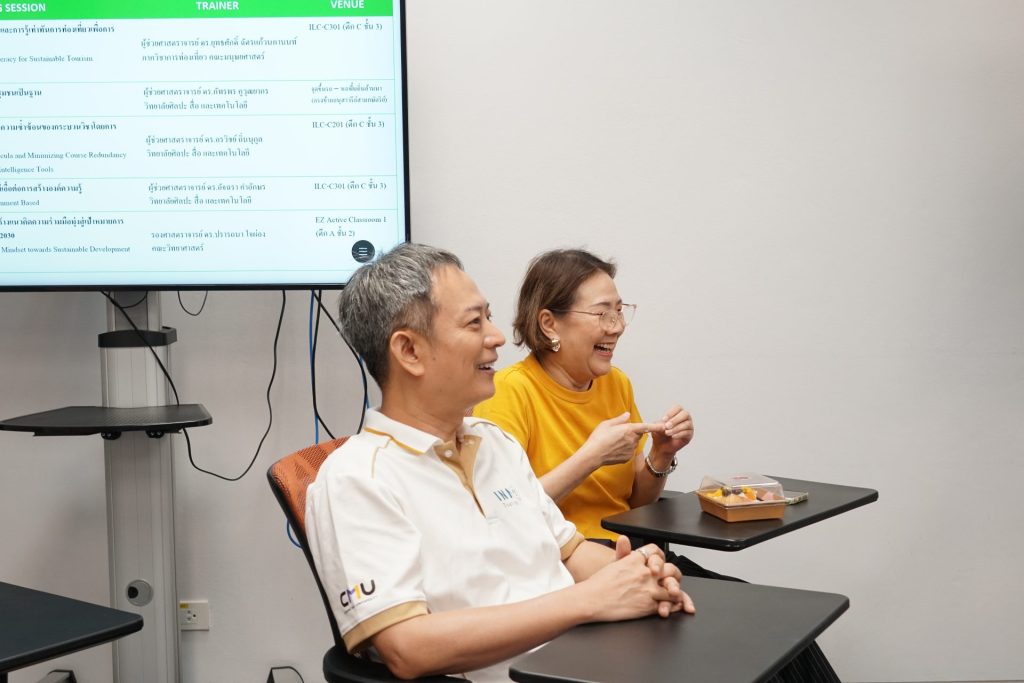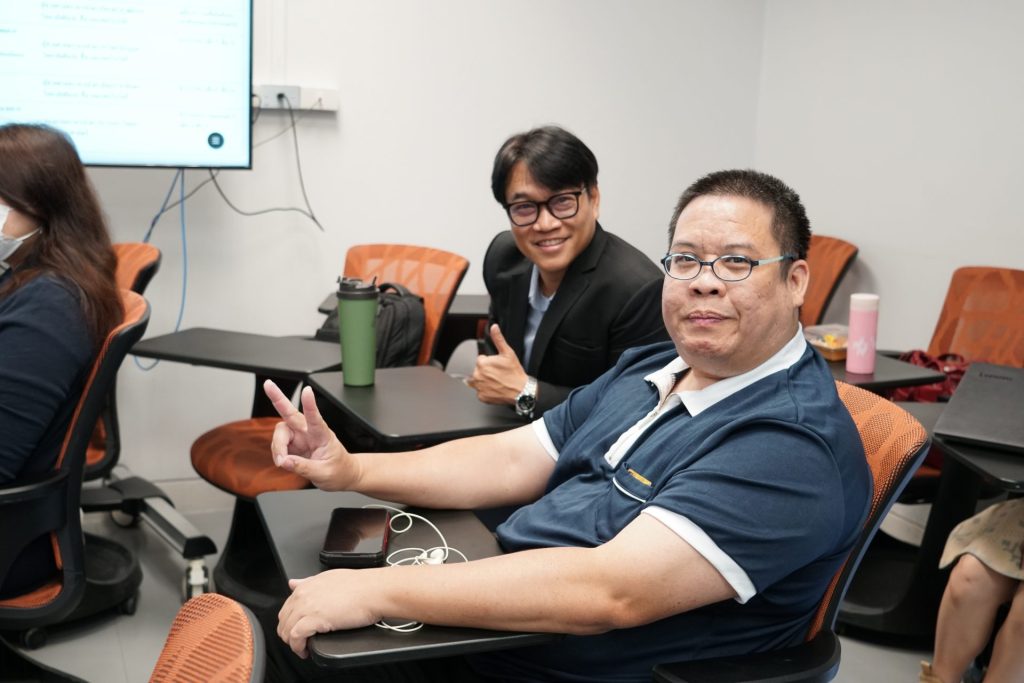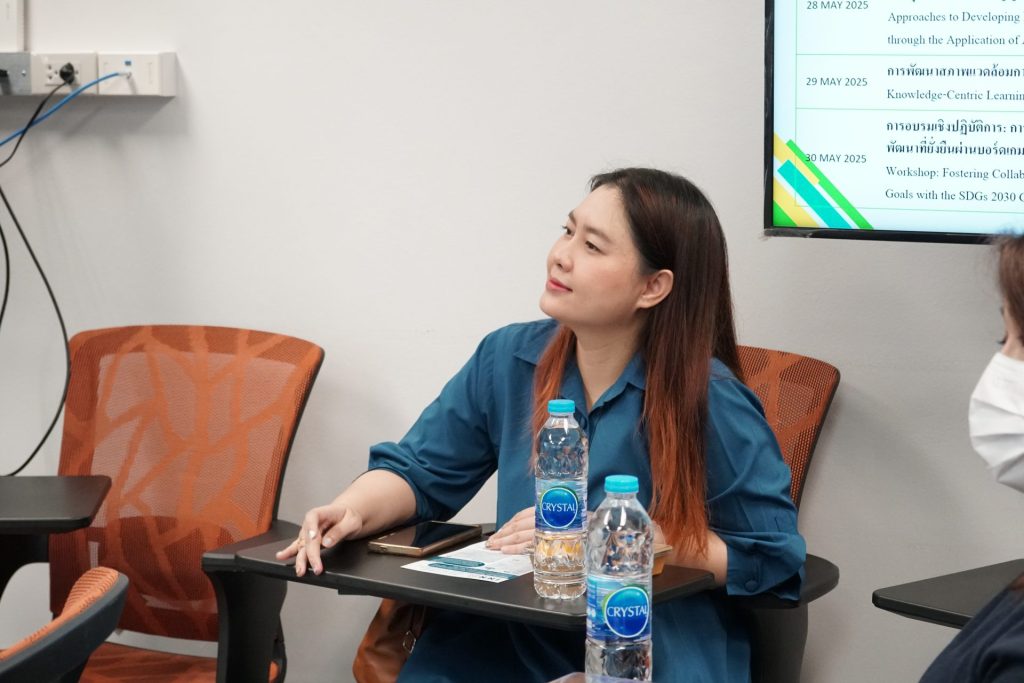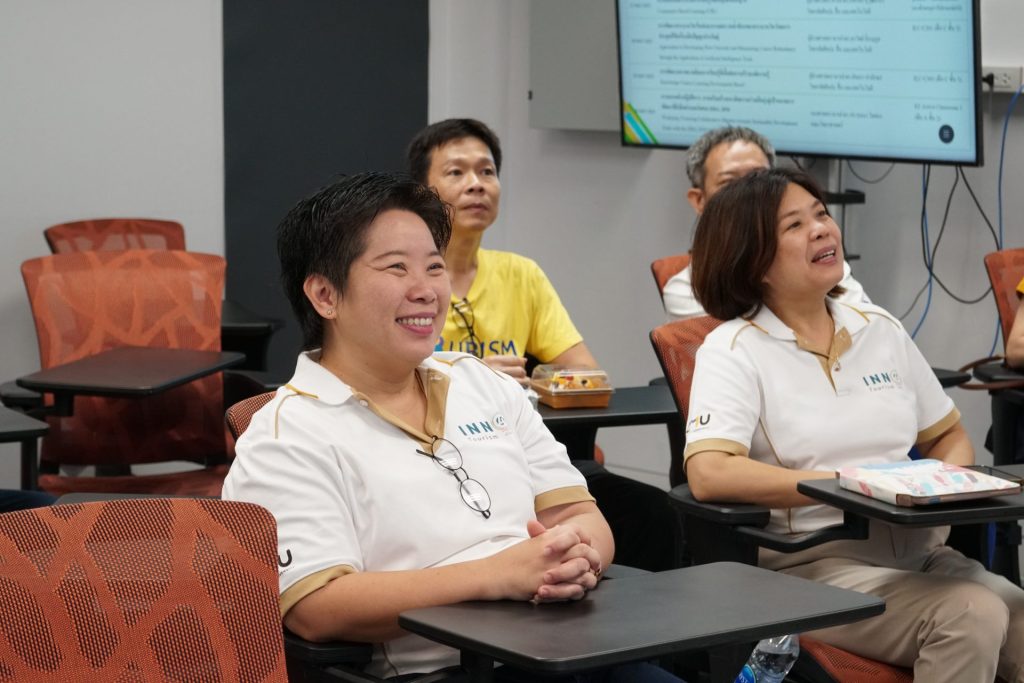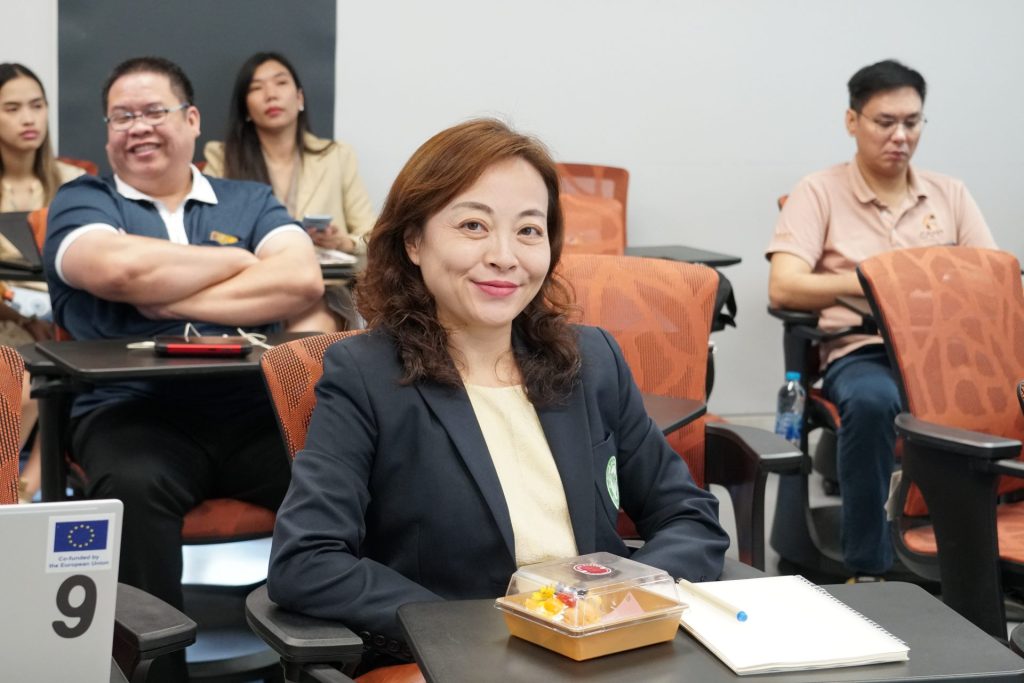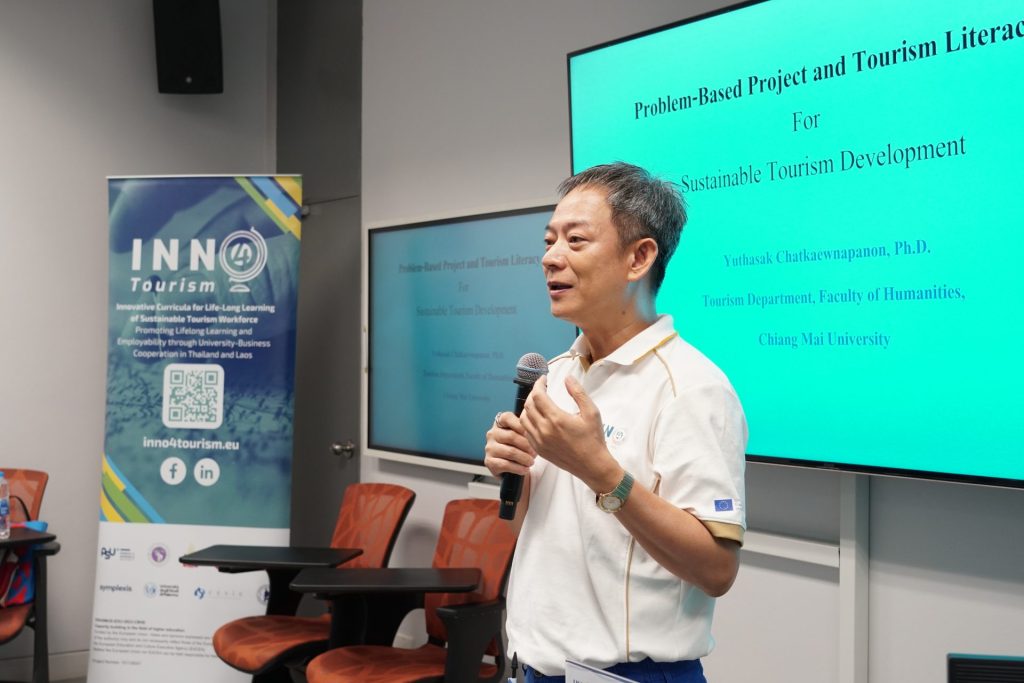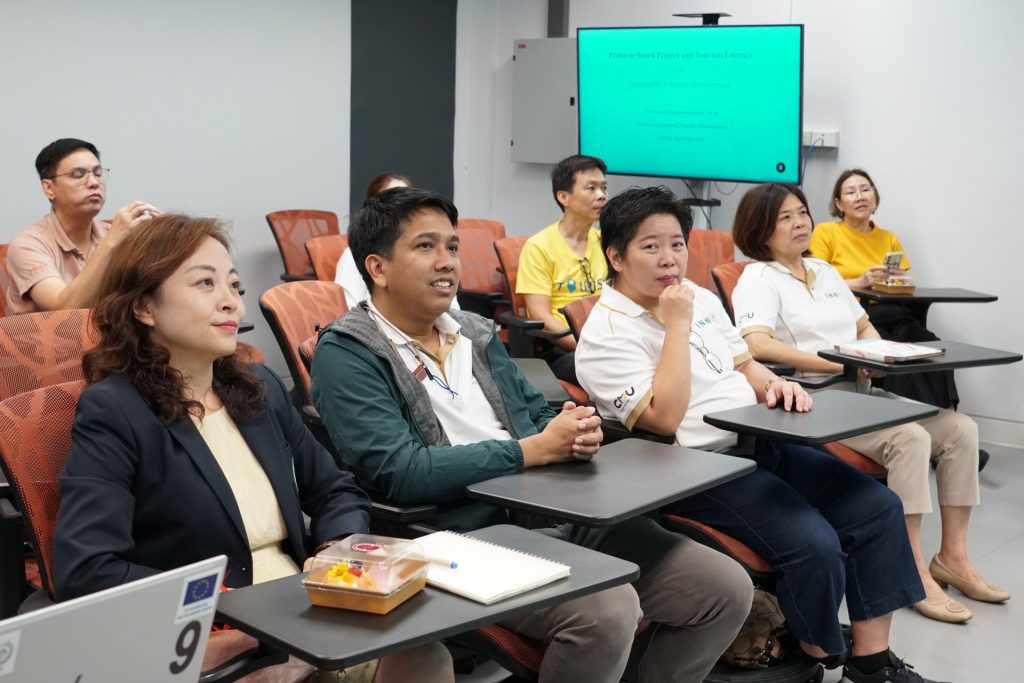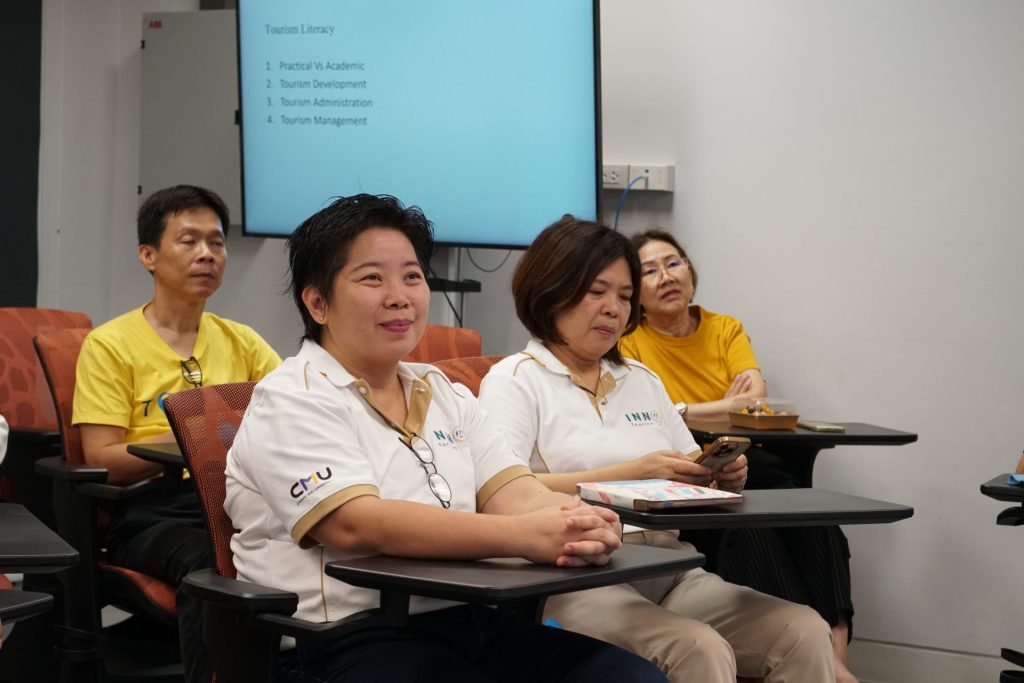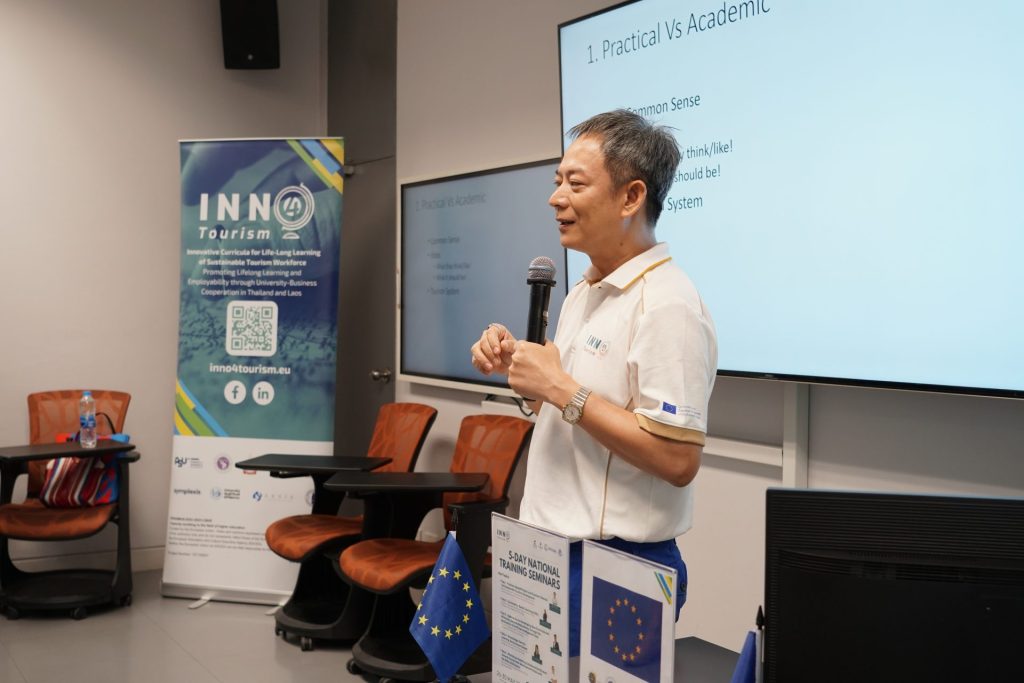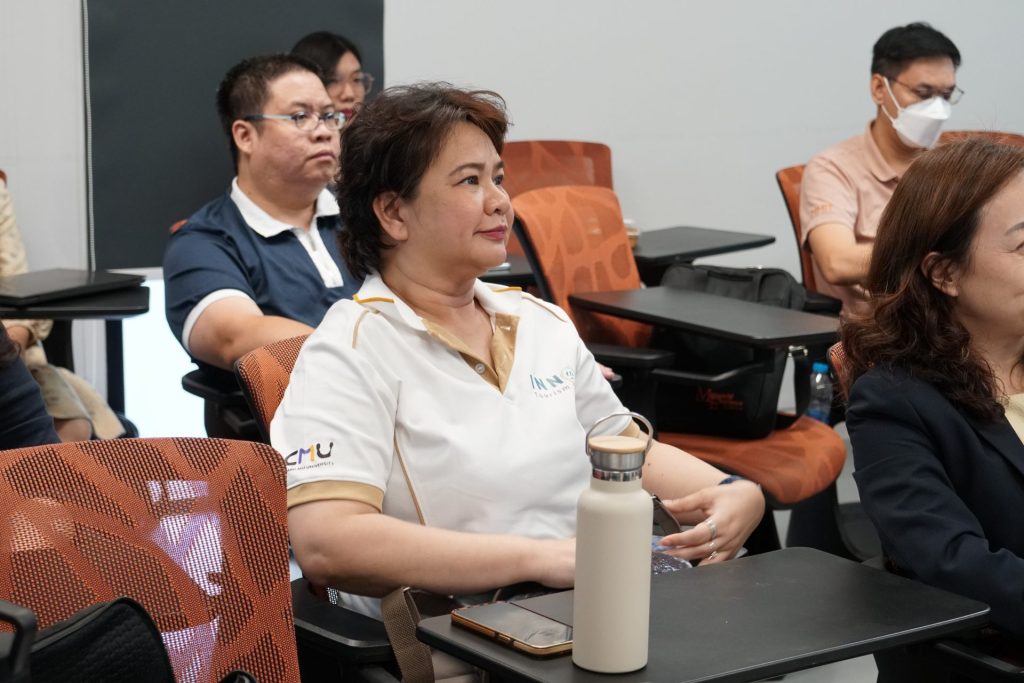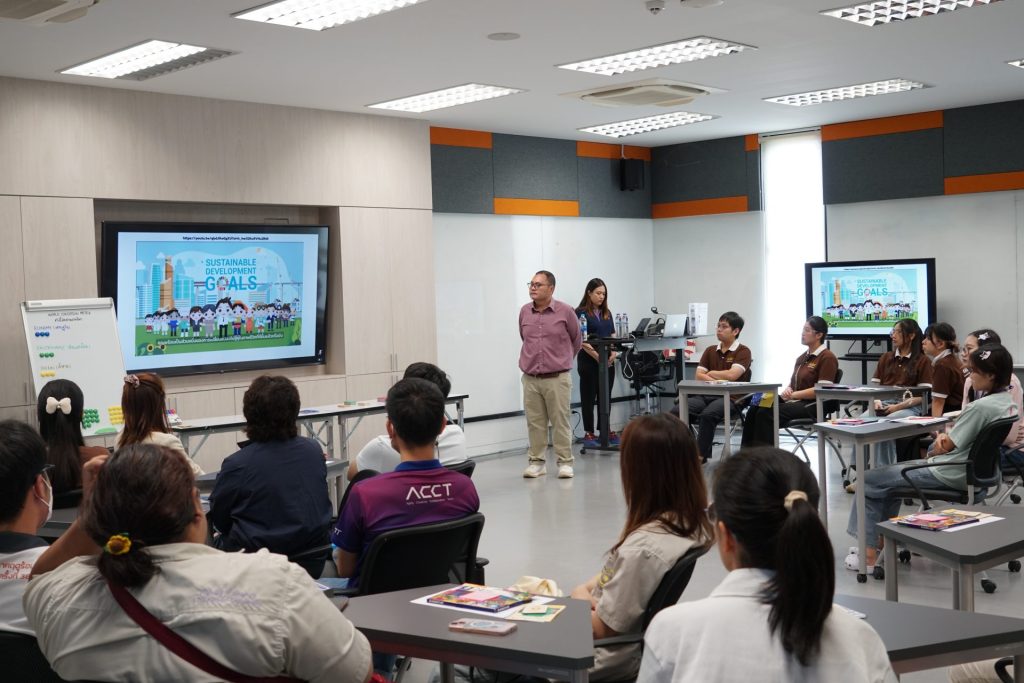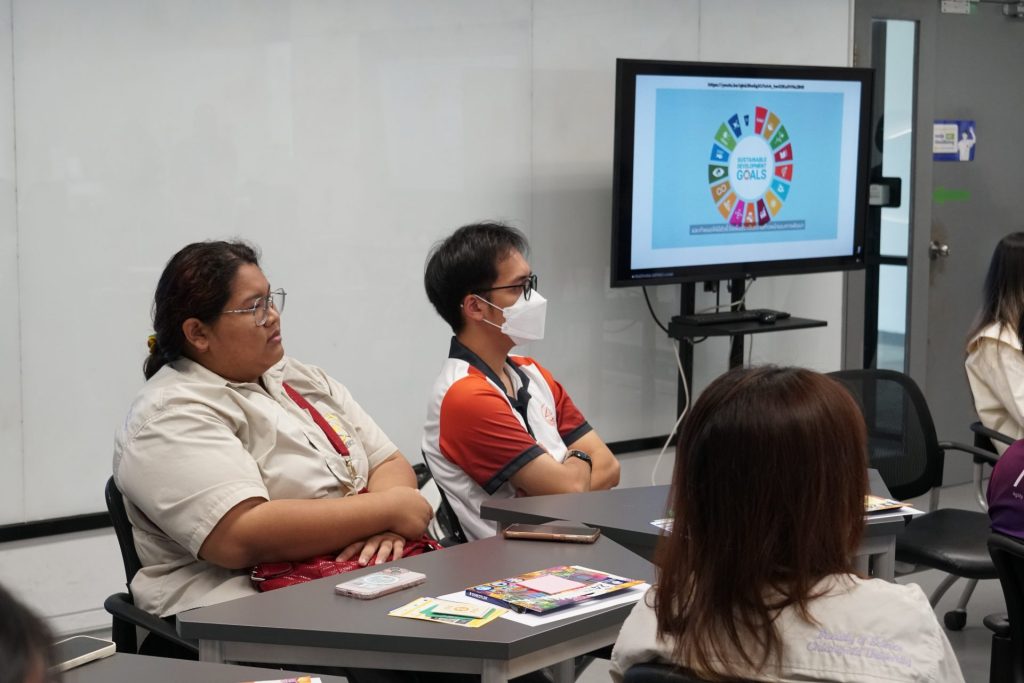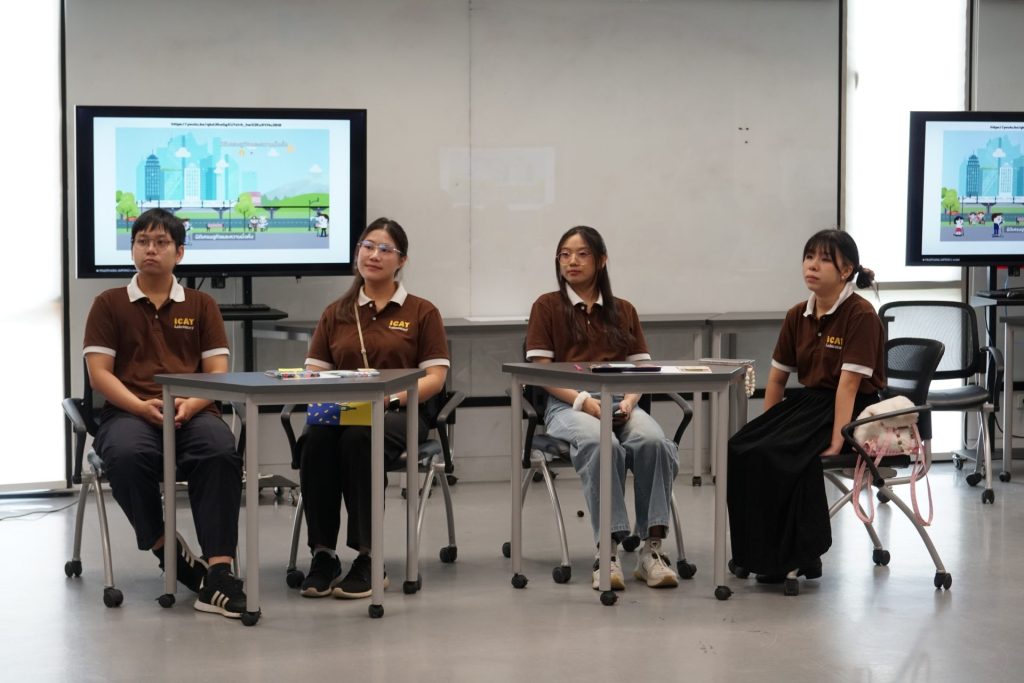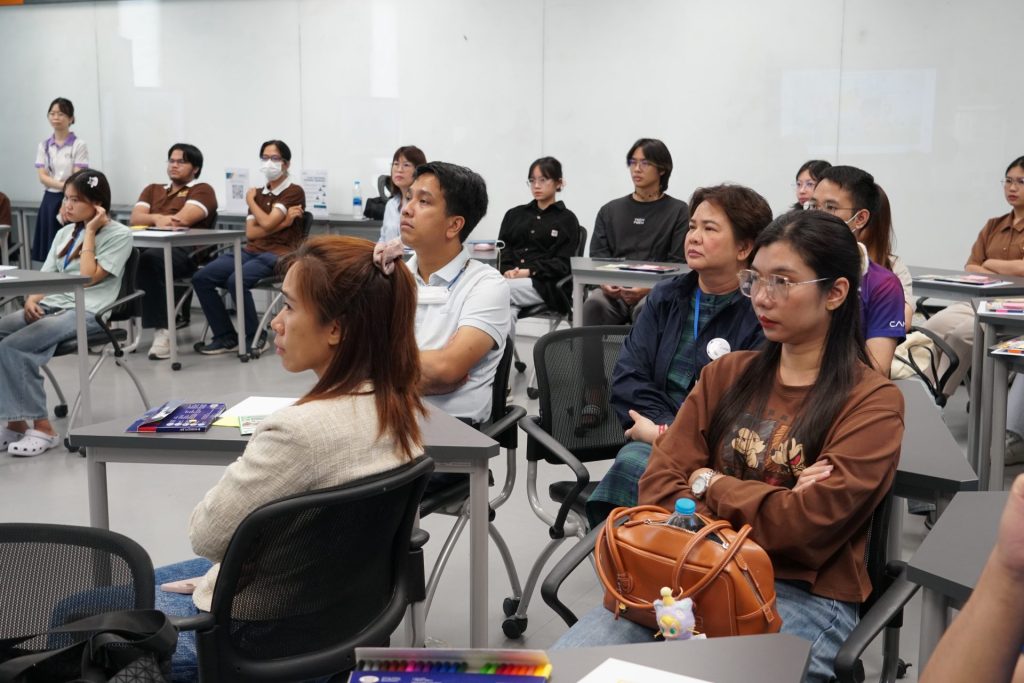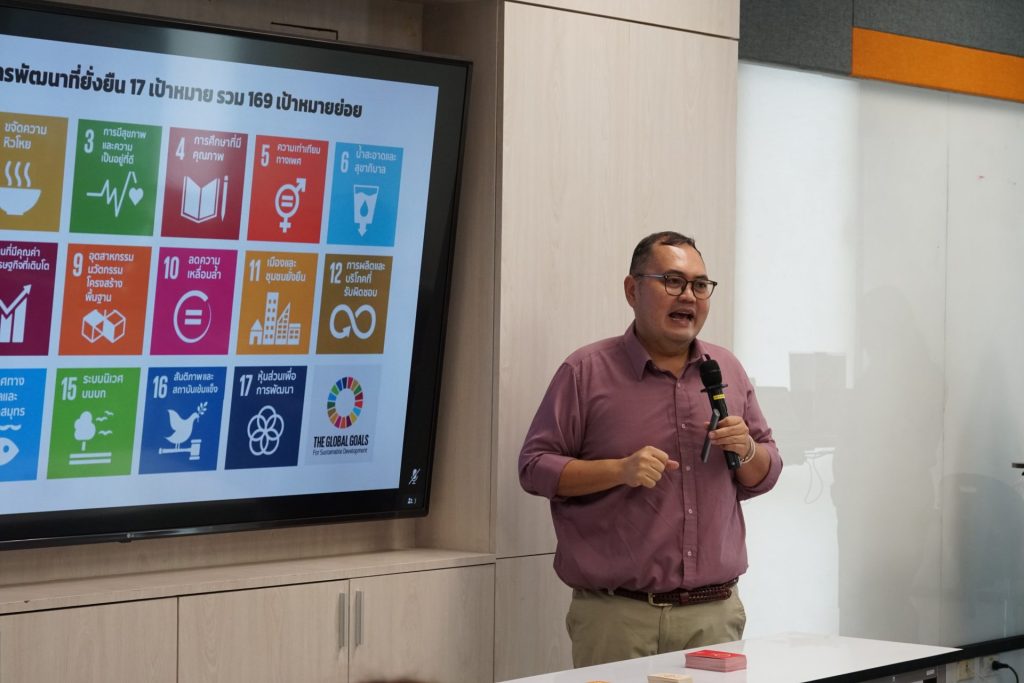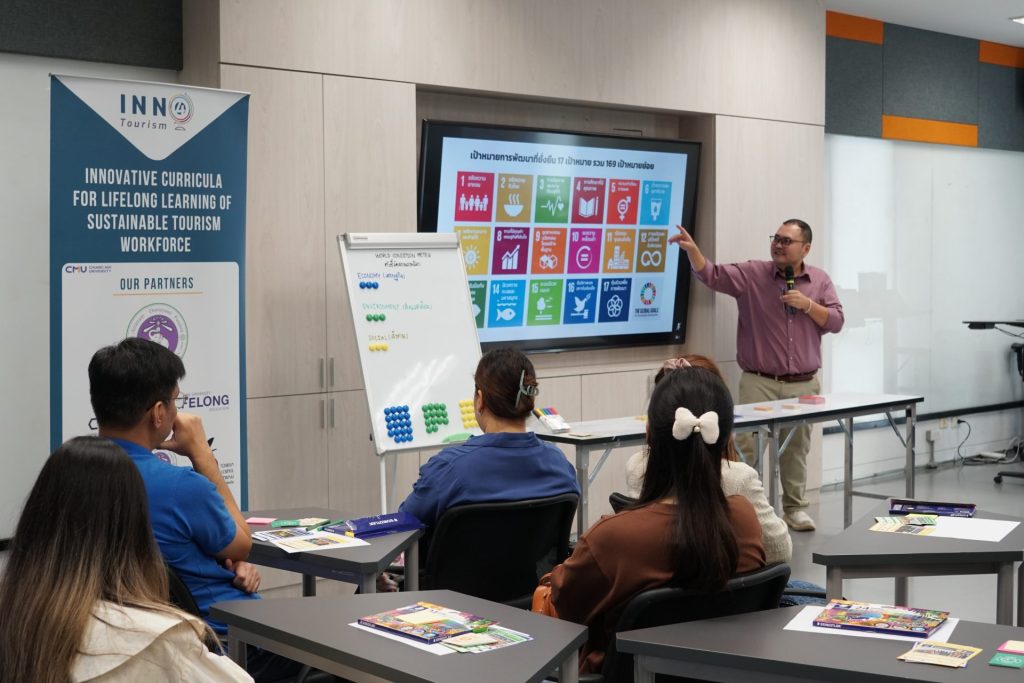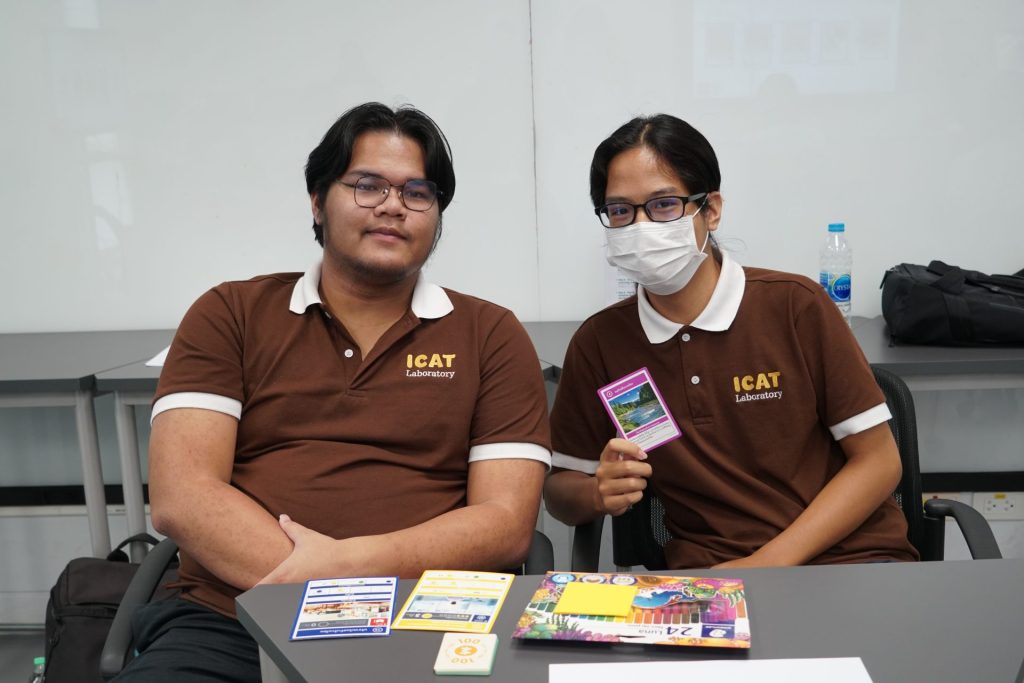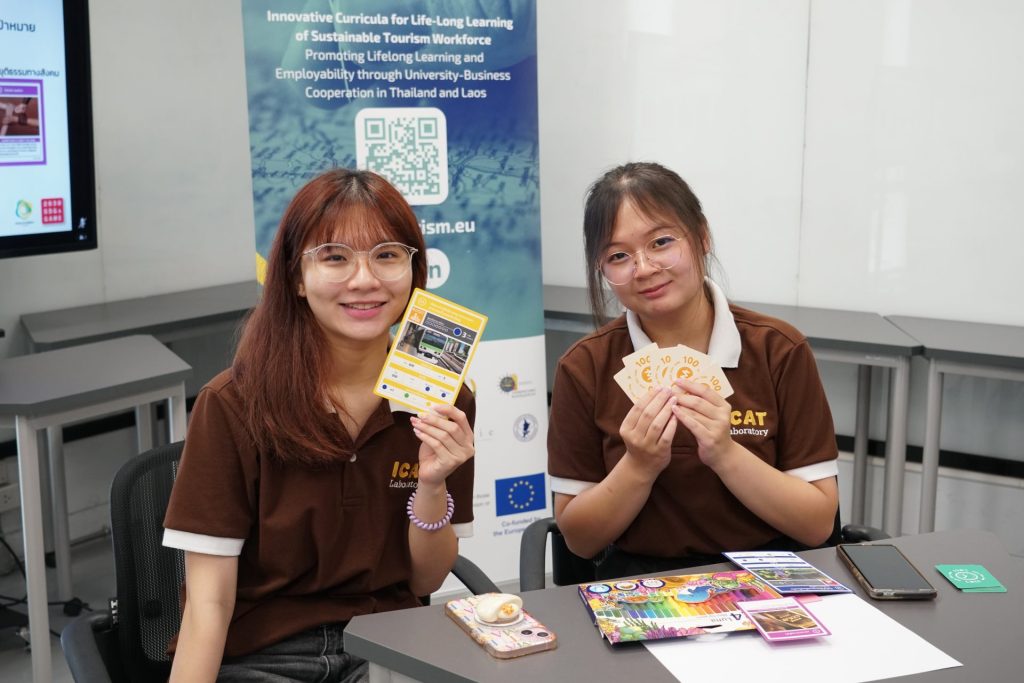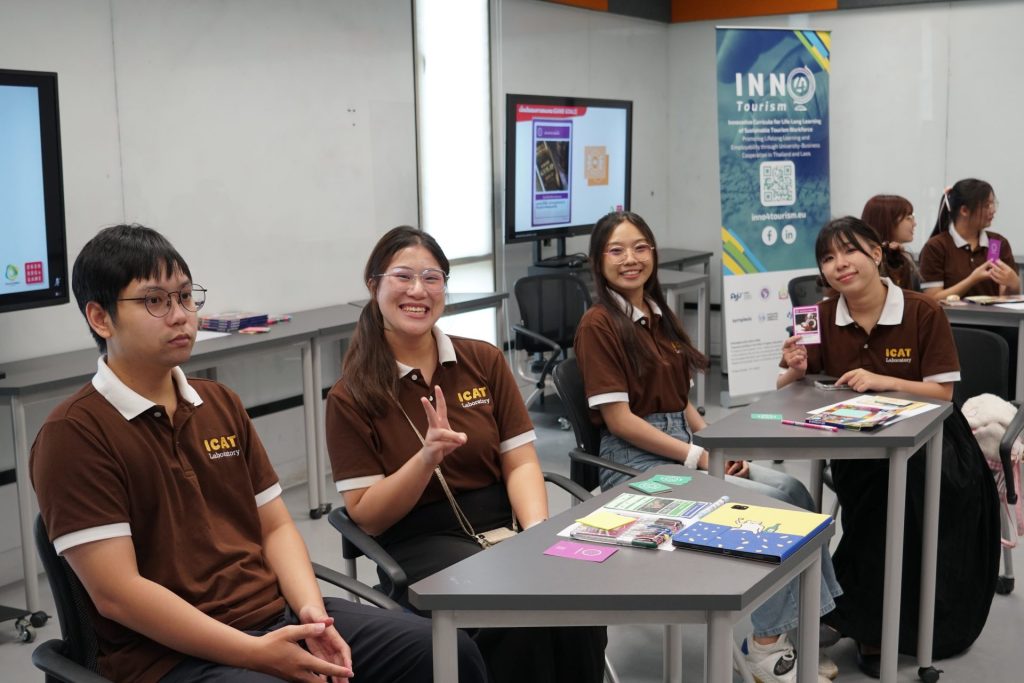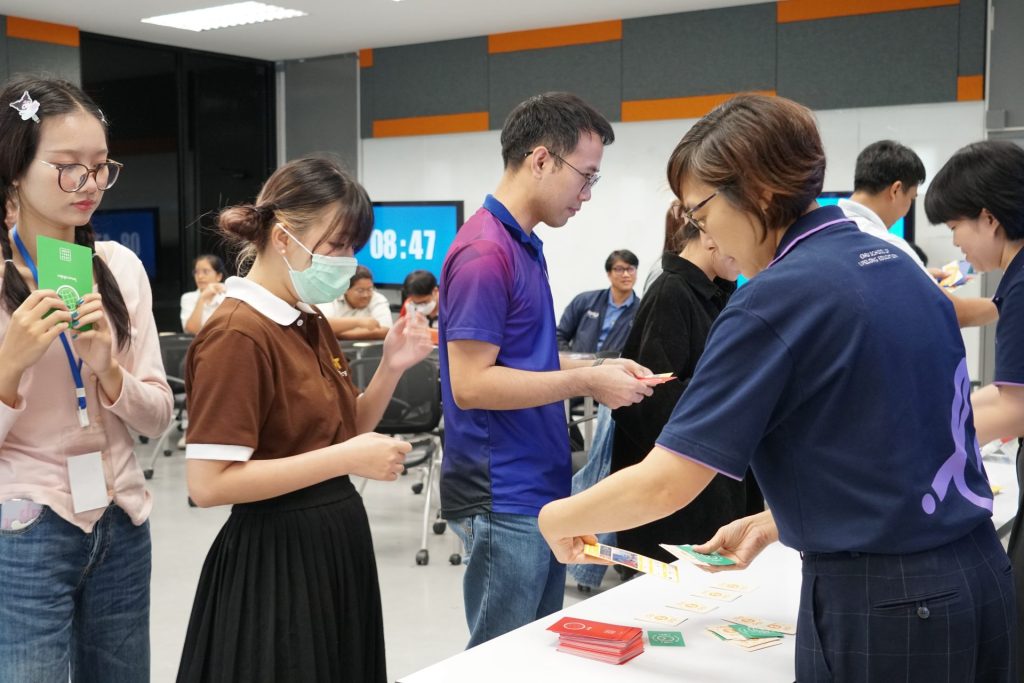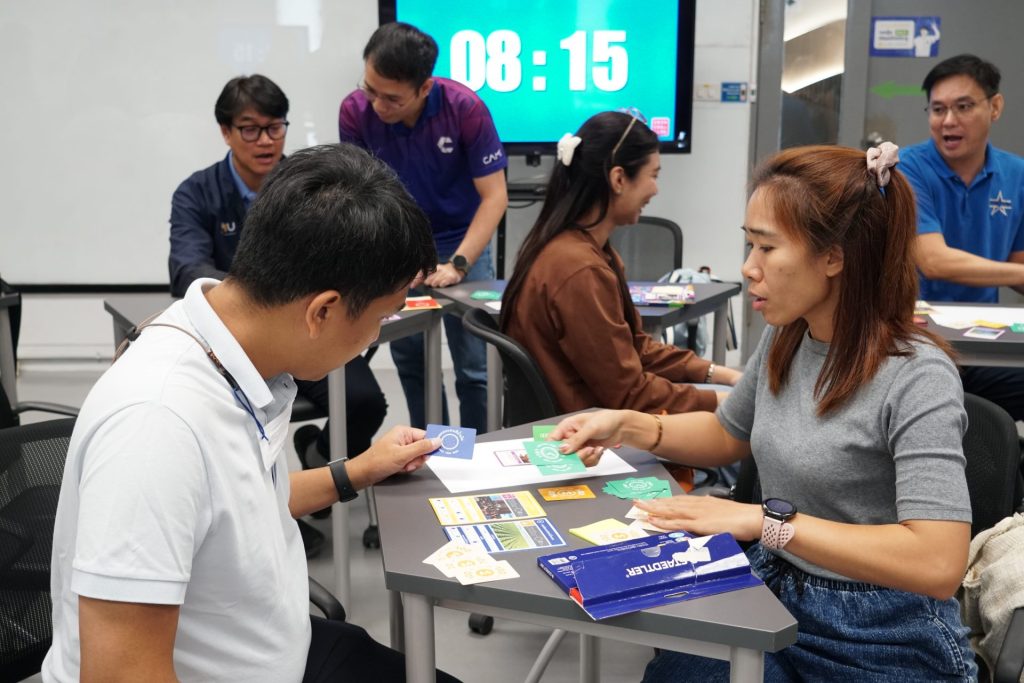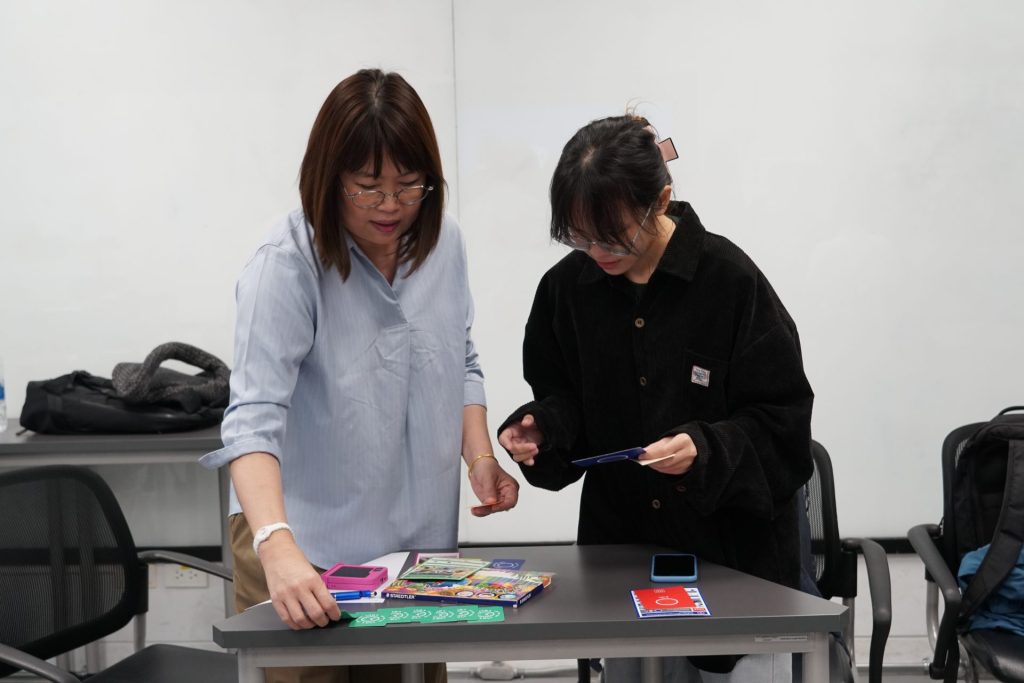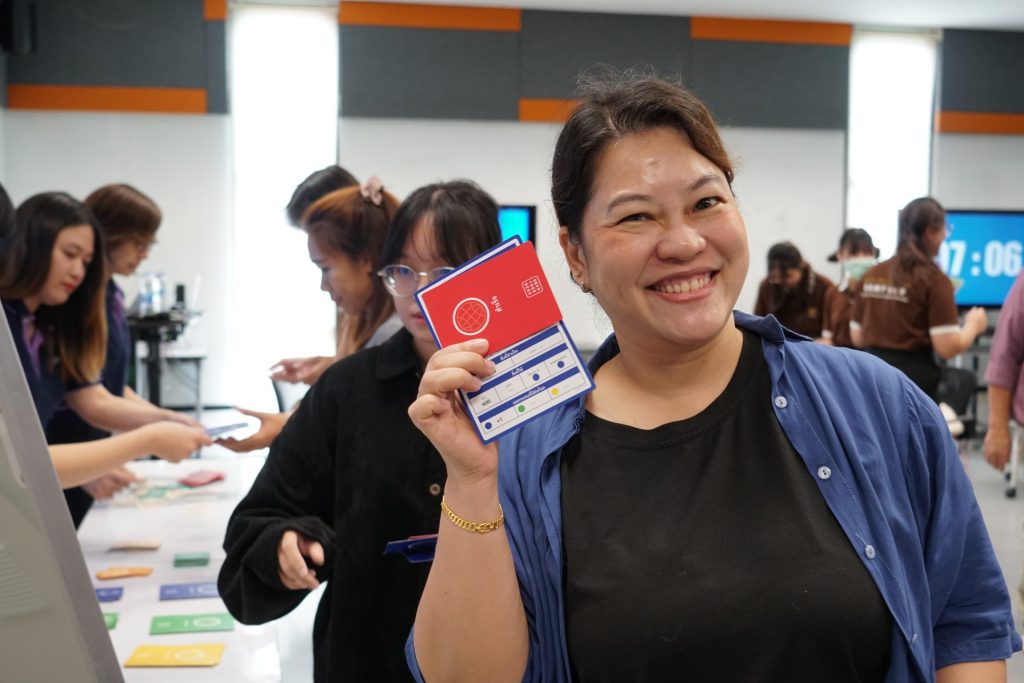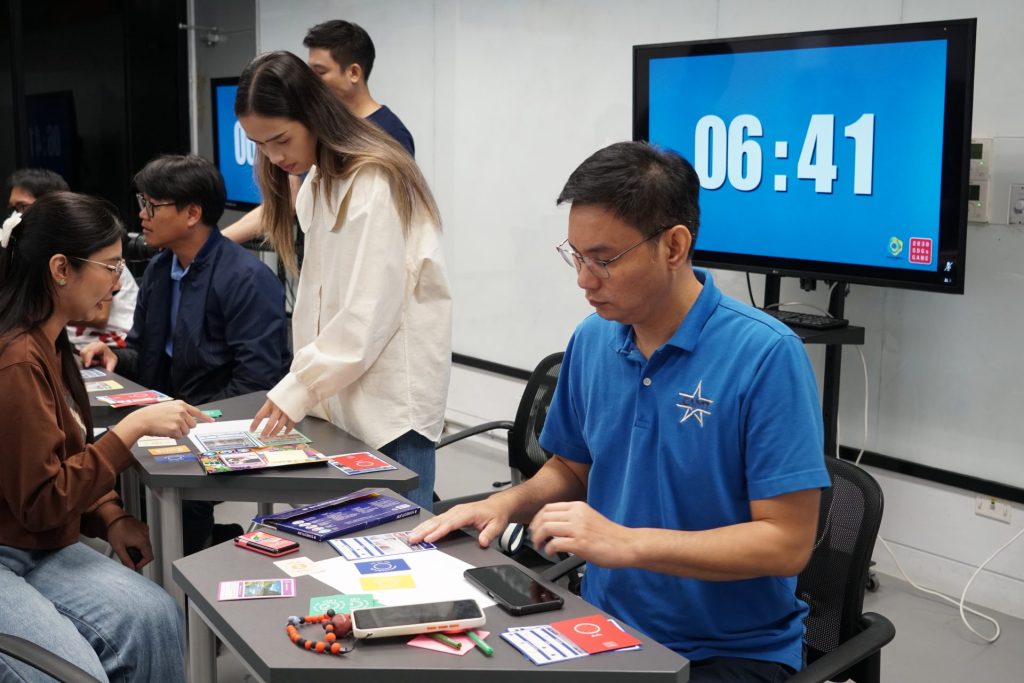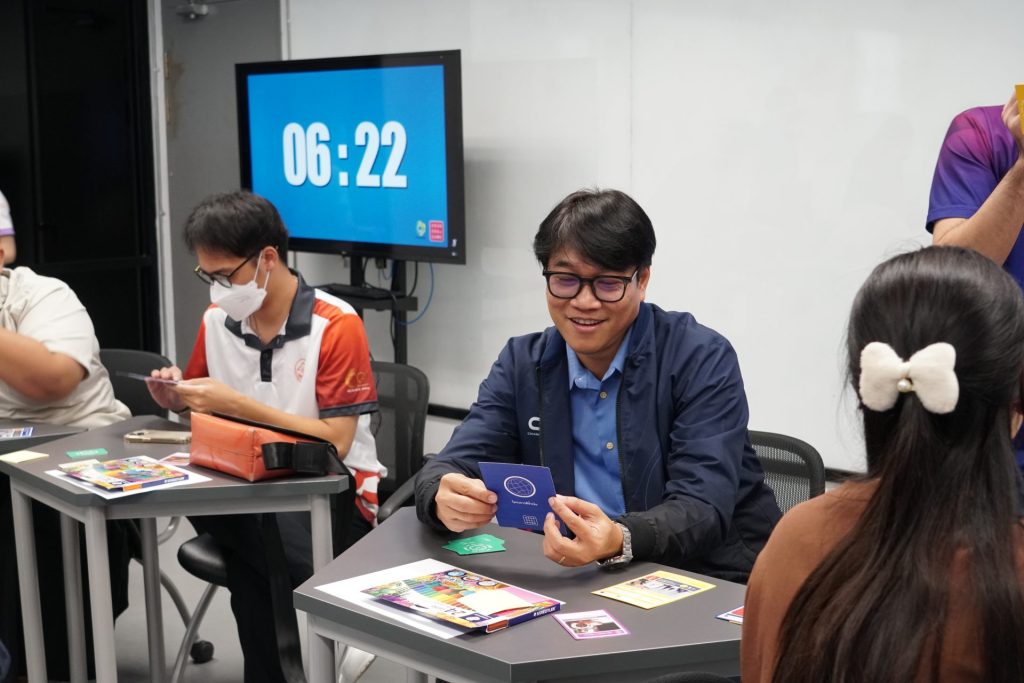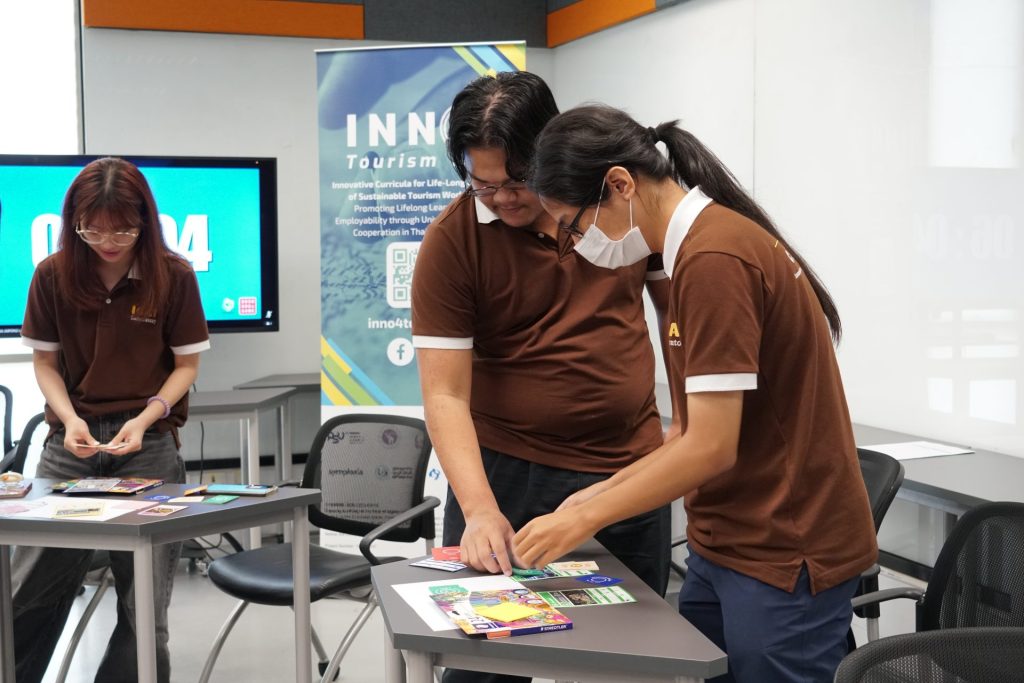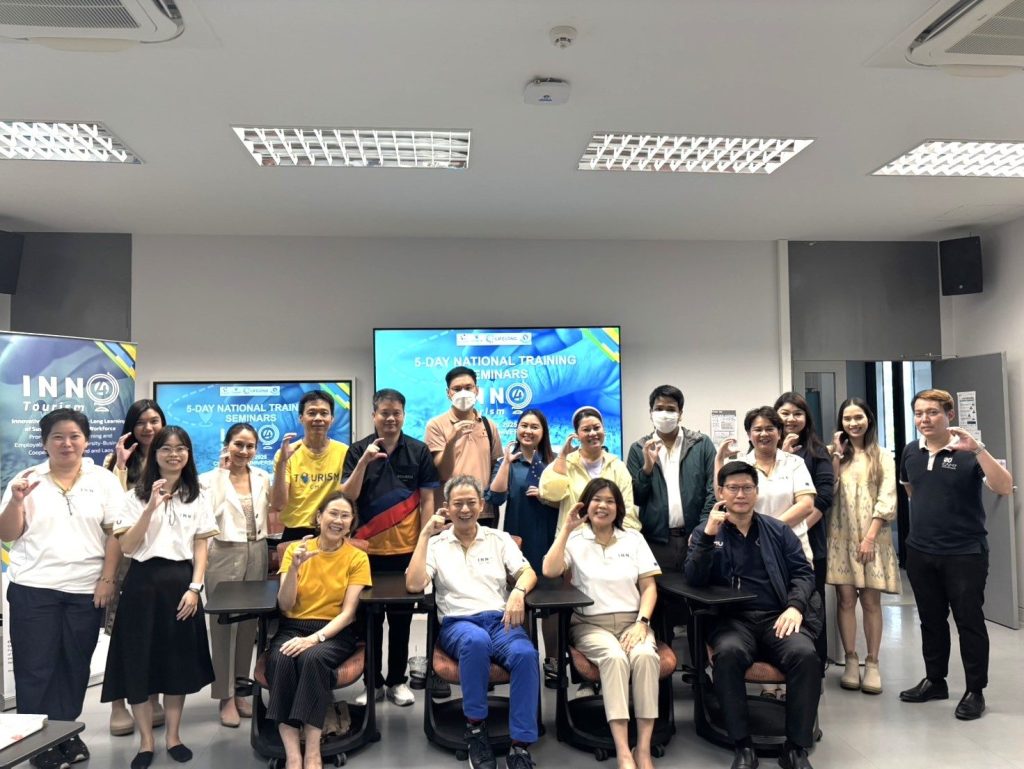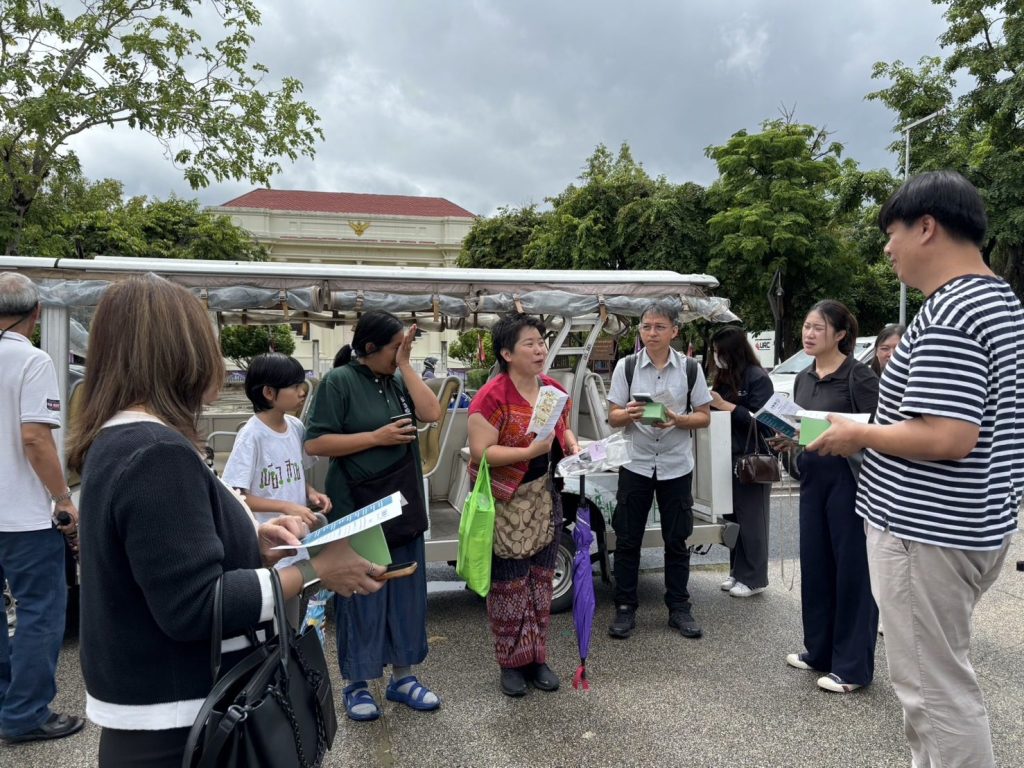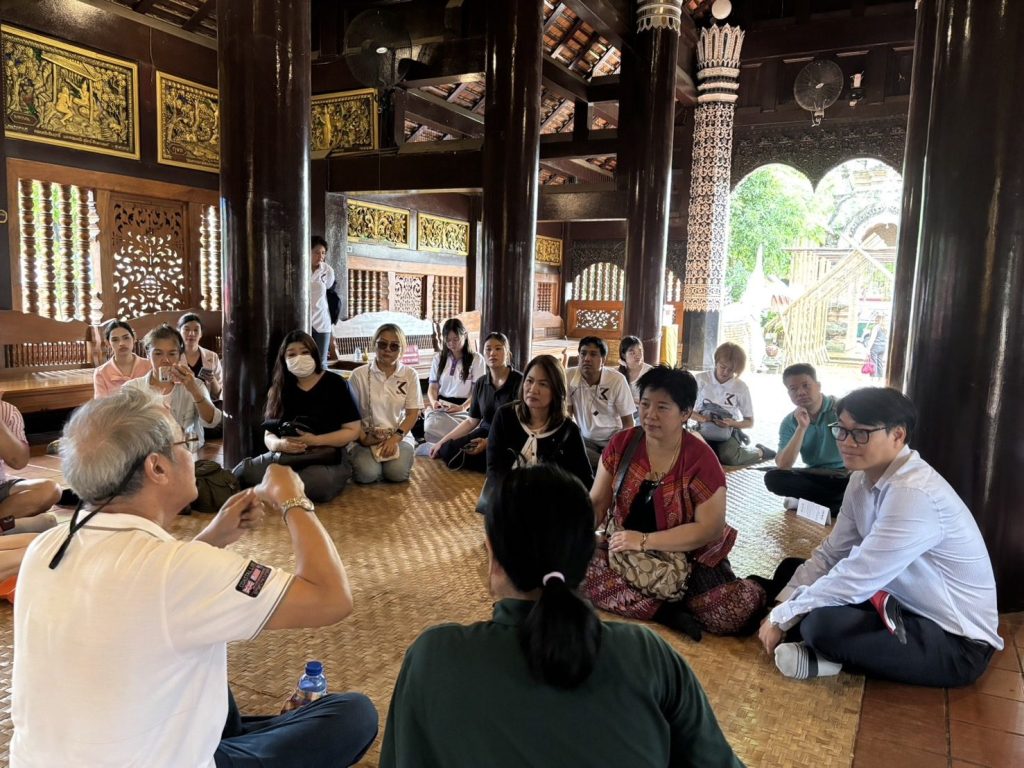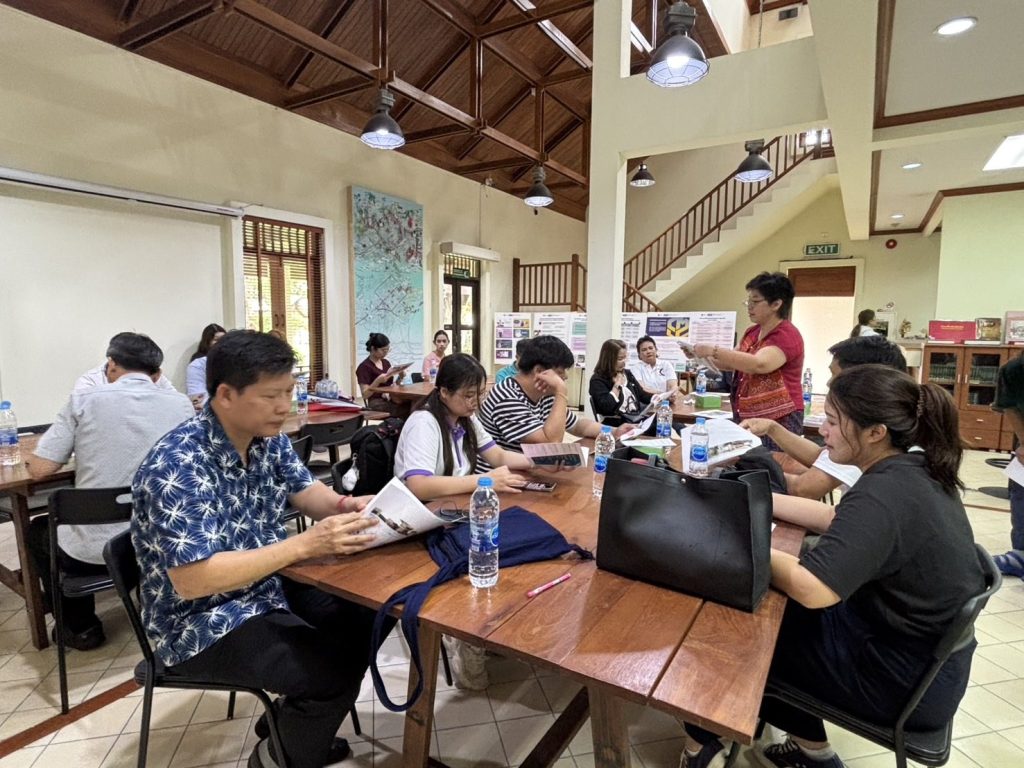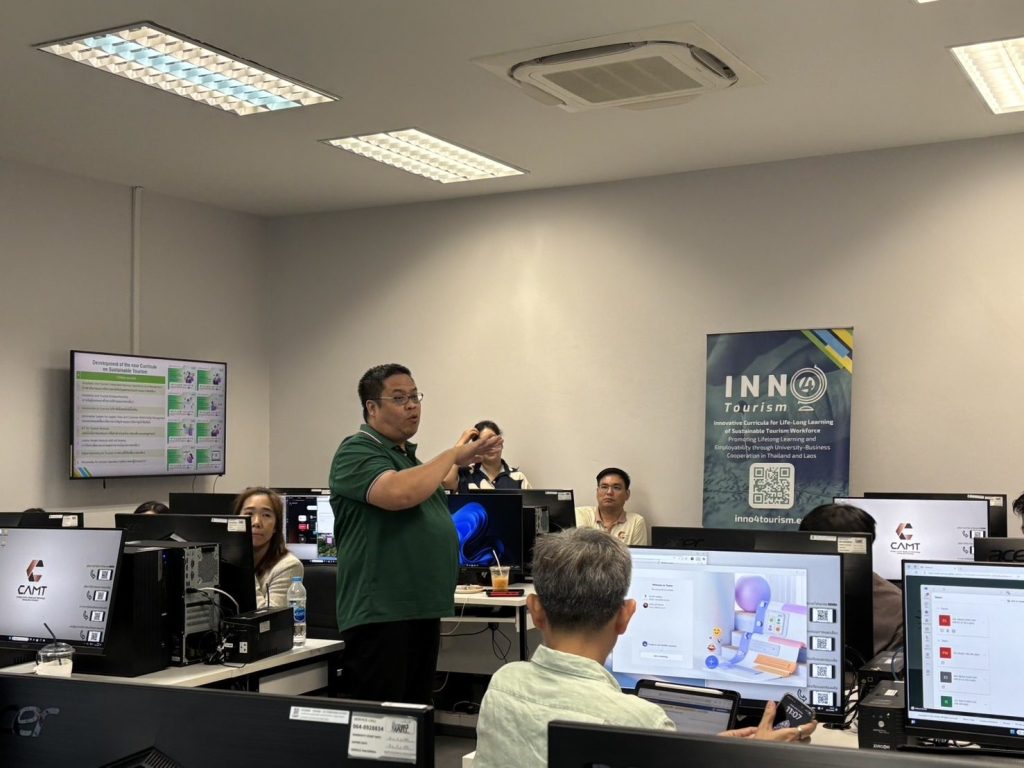(The CMU 5-Day National Training Seminars – INNO4Tourism)
โครงการ INNO4Tourism ซึ่งได้รับทุนสนับสนุนจากสหภาพยุโรป (European Union) โปรแกรมอีราสมุสพลัส (Erasmus+ Programme) มุ่งยกระดับและพัฒนาศักยภาพแรงงานในภาคอุตสาหกรรมการท่องเที่ยวและบริการ โดยมุ่งเน้นการเพิ่มขีดความสามารถของบุคลากรสถาบันอุดมศึกษาให้มีทักษะด้านการพัฒนาหลักสูตรด้านการท่องเที่ยวอย่างยั่งยืน รวมถึงทักษะอื่นที่จำเป็นต่อการเตรียมความพร้อมสู่ตลาดแรงงานให้แก่กลุ่มผู้เรียนในสาขาวิชาการท่องเที่ยวและบริการ ตลอดจนสาขาอื่นที่เกี่ยวข้อง ได้จัดกิจกรรมอบรมสัมมนาระดับชาติ 5 วัน (5-Day National Training Seminars) ระหว่างวันที่ 26-30 พฤษภาคม 2568 ณ ห้อง ILC-C301 ชั้น 3 ตึก C อาคารศูนย์นวัตกรรมและการเรียนรู้ มหาวิทยาลัยเชียงใหม่ โดยมีผู้เข้าร่วมจากหน่วยงานภายในมหาวิทยาลัยและภาคีเครือข่ายที่เกี่ยวข้องในโครงการ ซึ่งกิจกรรมนี้จัดขึ้นโดยความร่วมมือของวิทยาลัยศิลปะ สื่อ และเทคโนโลยี มหาวิทยาลัยเชียงใหม่ ภาควิชาการท่องเที่ยว คณะมนุษยศาสตร์ และวิทยาลัยการศึกษาตลอดชีวิต มหาวิทยาลัยเชียงใหม่
กิจกรรมนี้มีวัตถุประสงค์หลักเพื่อถ่ายทอดองค์ความรู้ด้านการพัฒนาหลักสูตรการท่องเที่ยวยั่งยืนสมัยใหม่ (Curriculum Development on Sustainable Tourism) ซึ่งเป็นส่วนหนึ่งของกระบวนการฝึกอบรมผู้ถ่ายทอดความรู้ (Training of Trainers: ToT Programme) เพื่อให้อาจารย์และบุคลากรที่เข้ารับการอบรมสามารถนำความรู้ไปประยุกต์ใช้และถ่ายทอดต่อในสถาบันของตนเองได้อย่างมีประสิทธิภาพ ครอบคลุมทั้งทักษะด้านการท่องเที่ยวอย่างยั่งยืน การเป็นผู้ประกอบการ การจัดการด้านการท่องเที่ยว ทักษะดิจิทัล ทักษะสีเขียว และทักษะด้าน Soft skills อันสำคัญต่อการพัฒนาแรงงานในยุคใหม่
โดยตลอดระยะเวลาฝึกอบรมมีกิจกรรมประกอบด้วยวันที่ 1 กิจกรรมสัมมนาหัวข้อ “Problem-Based Project and Tourism Literacy for Sustainable Tourism Development – การจัดการโครงการโดยใช้ปัญหาเป็นฐานและการรู้เท่าทันการท่องเที่ยวเพื่อการพัฒนาการท่องเที่ยวอย่างยั่งยืน” โดยมีวิทยากร ผู้ช่วยศาสตราจารย์ ดร.ยุทธศักดิ์ ฉัตรแก้วนภานนท์ หัวหน้าภาควิชาการท่องเที่ยว คณะมนุษยศาสตร์ ให้เกียรติบรรยาย เนื้อหามุ่งเน้นการนำเสนอกรอบแนวคิดพื้นฐานด้านการท่องเที่ยวเพื่อพัฒนาหลักสูตรที่สอดคล้องกับทักษะและความต้องการของผู้เรียนรวมถึงการสร้างมุมมองเชิงกลยุทธ์สำหรับการพัฒนาการท่องเที่ยวอย่างยั่งยืน
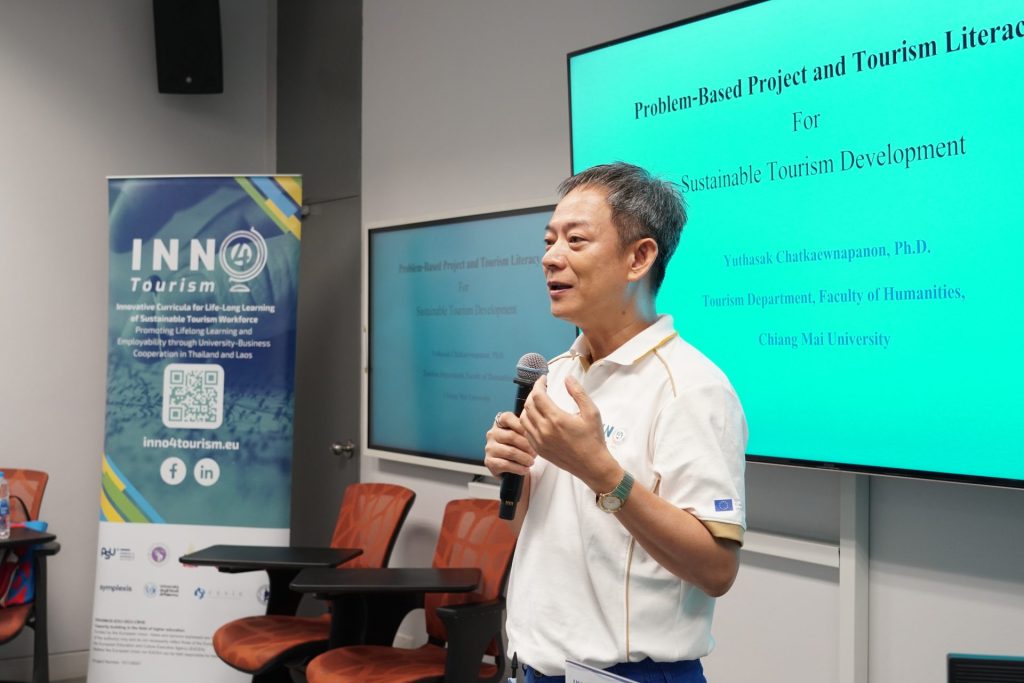
วันที่ 2 กิจกรรมสัมมนาหัวข้อ “Community-Based Learning (CBL) – การออกแบบกระบวนการเรียนรู้โดยใช้ชุมชนเป็นฐาน”โดยมีวิทยากร ผู้ช่วยศาสตราจารย์ ดร.ภัทรพร คูวุฒยากร วิทยาลัยศิลปะ สื่อ และเทคโนโลยี
นำเสนอแนวทางการบูรณาการการศึกษากับการมีส่วนร่วมในชุมชน ให้ผู้เรียนได้ลงมือปฏิบัติกับพื้นที่จริง เพื่อสร้างความเข้าใจต่อปัญหา สภาพแวดล้อม วัฒนธรรม และความต้องการของชุมชน เสริมสร้างทักษะวิชาการ ทักษะชีวิต และความรับผิดชอบต่อสังคม ผ่านกรณีศึกษา “เขียว ชม เมือง” นั่งรถรางชมเมืองศึกษาเส้นทางท่องเที่ยวเชิงประวัติศาสตร์เมืองเก่าในเขตเมืองเก่าเชียงใหม่ โดยได้ความร่วมมือจาก “เครือข่ายเชียงใหม่ เขียว สวย หอม”
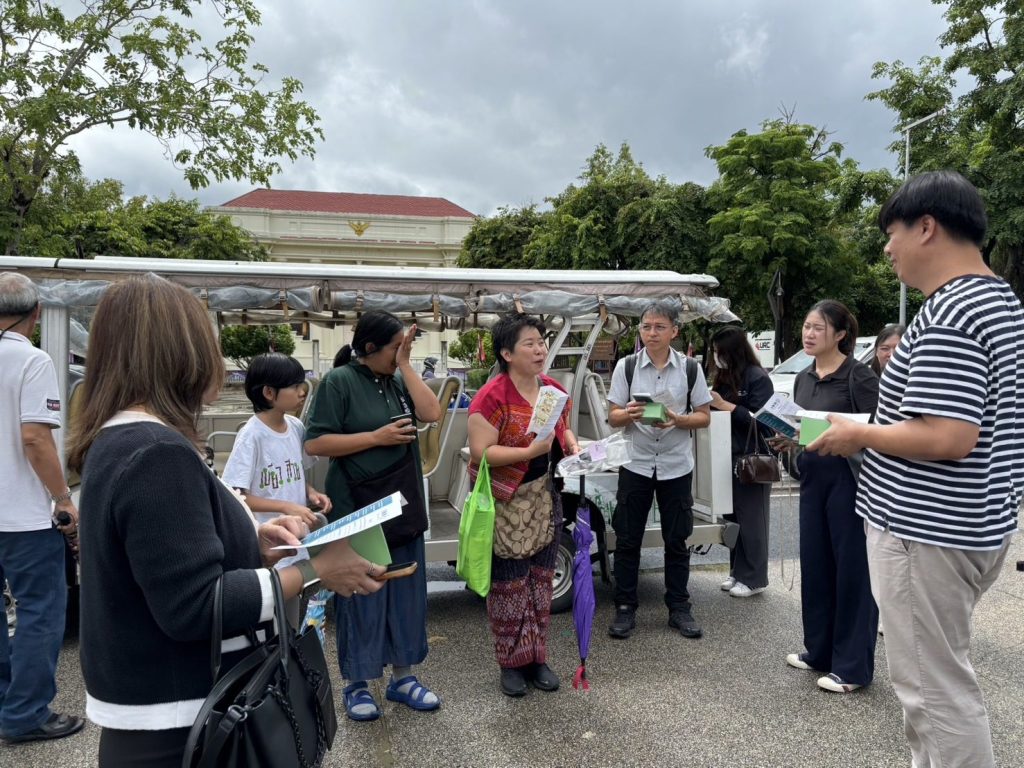
วันที่ 3 กิจกรรมสัมมนาหัวข้อ “Development on New Curricular based on the UBC Approach and Minimizing Courses Redundancy though the Application Intelligence Tools – การพัฒนาหลักสูตรใหม่ตามแนวทาง UBC Mechanism และลดความซ้ำซ้อนของรายวิชาด้วยเครื่องมือปัญญาประดิษฐ์”
โดยมีวิทยากร ผู้ช่วยศาสตราจารย์ ดร.อรวิชย์ ถิ่นนุกูล วิทยาลัยศิลปะ สื่อ และเทคโนโลยี
เน้นการวิเคราะห์ความต้องการของตลาดเพื่อพัฒนาหลักสูตร โดยใช้ข้อมูลและเครื่องมือทันสมัยสอดคล้องกับแนวคิดกลไก University-Business Cooperation Mechanism (UBC Mechanism) ช่วยให้หลักสูตรตอบโจทย์ภาคอุตสาหกรรม ลดความซ้ำซ้อนของเนื้อหาด้วย AI Tools และเปิดโอกาสให้คณาจารย์ได้ร่วมอภิปรายและแลกเปลี่ยนประสบการณ์การพัฒนาหลักสูตร
วันที่ 4 กิจกรรมสัมมนาหัวข้อ “Knowledge-Centric Leaning Environment Based – การพัฒนาสภาพแวดล้อมการเรียนรู้ที่เอื้อต่อการสร้างองค์ความรู้”
โดยมีวิทยากร ผู้ช่วยศาสตราจารย์ ดร.อัจฉรา คำอักษร วิทยาลัยศิลปะ สื่อ และเทคโนโลยี
กิจกรรมเน้นการออกแบบสภาพแวดล้อมการเรียนรู้ที่ส่งเสริมการสร้างและแลกเปลี่ยนองค์ความรู้ในบริบทการท่องเที่ยว โดยผู้สอนมีบทบาทเป็น Facilitator อำนวยความสะดวก ออกแบบกระบวนการเรียนรู้ มากกว่าการถ่ายทอดเนื้อหา พร้อมกิจกรรม Workshop ให้ผู้เข้าร่วมได้ลงมือออกแบบจริงผ่านเครื่องมือ KLE CANVAS
.
วันที่ 5 กิจกรรมอบรมเชิงปฏิบัติการ “Fostering Collaborative Mindset towards Sustainable Development Goals with the SDGs 2030 Game – การเสริมสร้างแนวคิดการทำงานร่วมกันเพื่อมุ่งสู่เป้าหมายการพัฒนาที่ยั่งยืนด้วยบอร์ดเกม SDGs 2030”
โดยมีวิทยากร รองศาสตราจารย์ ดร.ปรารถนา ใจผ่อง คณะวิทยาศาสตร์
ซึ่งเป็นกิจกรรมเด่นในวันสุดท้าย การใช้บอดร์เกม SDGs 2030 เกมจำลองที่ออกแบบให้ผู้เข้าร่วมได้เรียนรู้และเข้าใจเป้าหมายการพัฒนาที่ยั่งยืนทั้ง 17 ข้อ ของสหประชาชาติ ผ่านสถานการณ์จำลอง ผู้เข้าร่วมต่างได้สัมผัสและตระหนักถึงความสำคัญของการทำงานร่วมกันและการบริหารทรัพยากรอย่างสมดุล โดยเฉพาะเมื่อสะท้อนกลับไปยังบริบทของอุตสาหกรรมภาคท่องเที่ยวอย่างยั่งยืน บูรณาการร่วมกับทักษะดิจิทัล ทักษะสีเขียว และ Soft skills ต่าง ๆ ที่จำเป็นสำหรับแรงงานยุคใหม่
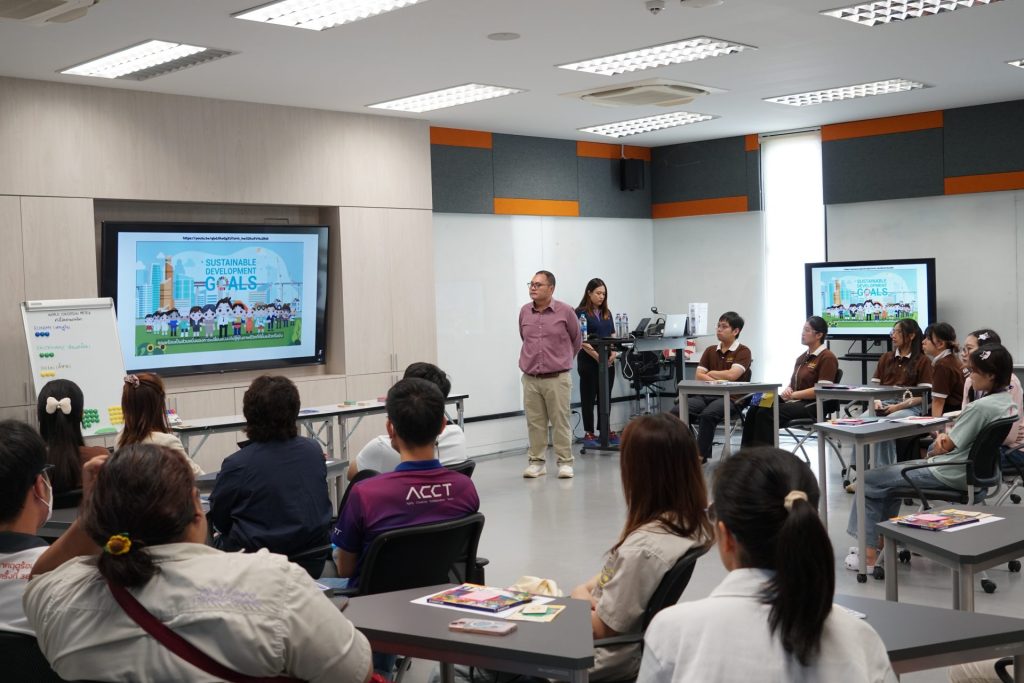
ตลอดระยะเวลา 5 วันของการสัมมนา ผู้เข้าร่วมกิจกรรมได้รับโอกาสสำคัญในการเรียนรู้จากผู้เชี่ยวชาญ ได้แลกเปลี่ยนประสบการณ์กับเครือข่ายทั้งในและนอกมหาวิทยาลัย ฝึกปฏิบัติผ่านกิจกรรมจริงทั้งในเชิงทฤษฎีและปฏิบัติ ตลอดจนได้พัฒนาแนวคิด ทักษะใหม่ ๆ ที่สามารถนำไปประยุกต์ใช้ในงานสอนได้ นอกจากนี้ผู้เข้าร่วมยังได้เห็นแนวทางการพัฒนา ปรับปรุงเนื้อหาวิชาที่ตอบโจทย์ความต้องการและเกิดแรงบันดาลใจในการต่อยอดความรู้สู่การพัฒนาอย่างเป็นระบบ โดยหลังจากนี้ โครงการ INNO4Tourism จะมีกิจกรรมเปิดตัวกระบวนวิชาด้านการท่องเที่ยวอย่างยั่งยืนที่พัฒนาโดยตัวแทนคณาจารย์มหาวิทยาลัยเชียงใหม่ ร่วมกับเครือข่าย 3 มหาวิทยาลัยชั้นนำในภูมิภาคเอเชียตะวันออกเฉียงใต้ เพื่อเผยแพร่และต่อยอดองค์ความรู้สู่การเรียนการสอนในอนาคตต่อไป
The CMU 5-Day National Training Seminars – INNO4Tourism Project
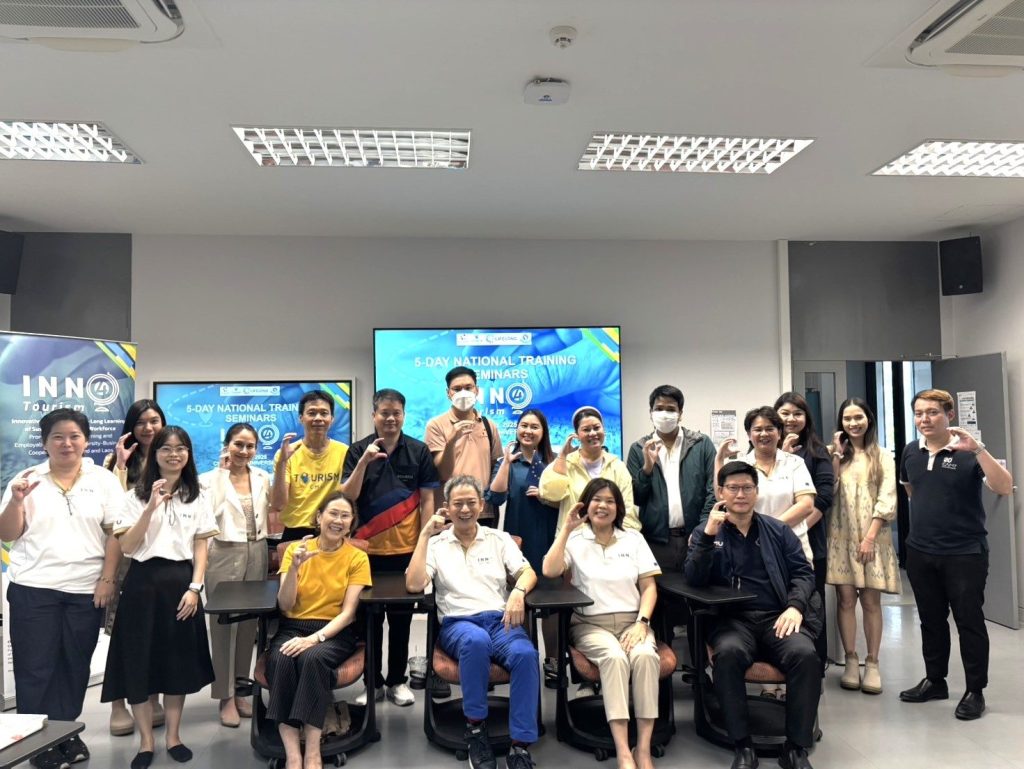
The INNO4Tourism project, funded by the European Union under the Erasmus+ Programme, aims to contribute to the alignment of HEIs in Thailand with the hospitality and tourism labor market to enhance and develop the capacity of the tourism and hospitality workforce. It also seeks to equip tourism and hospitality students and in related fields with the necessary skills to prepare for the labor market. A “5-Day National Training Seminars” was organized during 26-30 May 2025, at Room ILC-C301, 3rd Floor, Building C, Innovation and Learning Center, Chiang Mai University. There were participants from various departments within the university and partner networks involved in the project attended the seminars. This activity was organized in collaboration with the College of Arts, Media and Technology, the Department of Tourism at the Faculty of Humanities, and the CMU School of Lifelong Education.
.
The objectives of this activity is to transfer knowledge on curriculum dDevelopment on sustainable tourism as part of the Training of Trainers Programme (ToT Programme). It was designed to enable participating lecturers and staff to effectively apply and transfer knowledge within their own institutions. The training covered various essential aspects, including sustainable tourism skills, entrepreneurship, tourism management, digital skills, green skills, and soft skills needed for workforce development in the modern era.
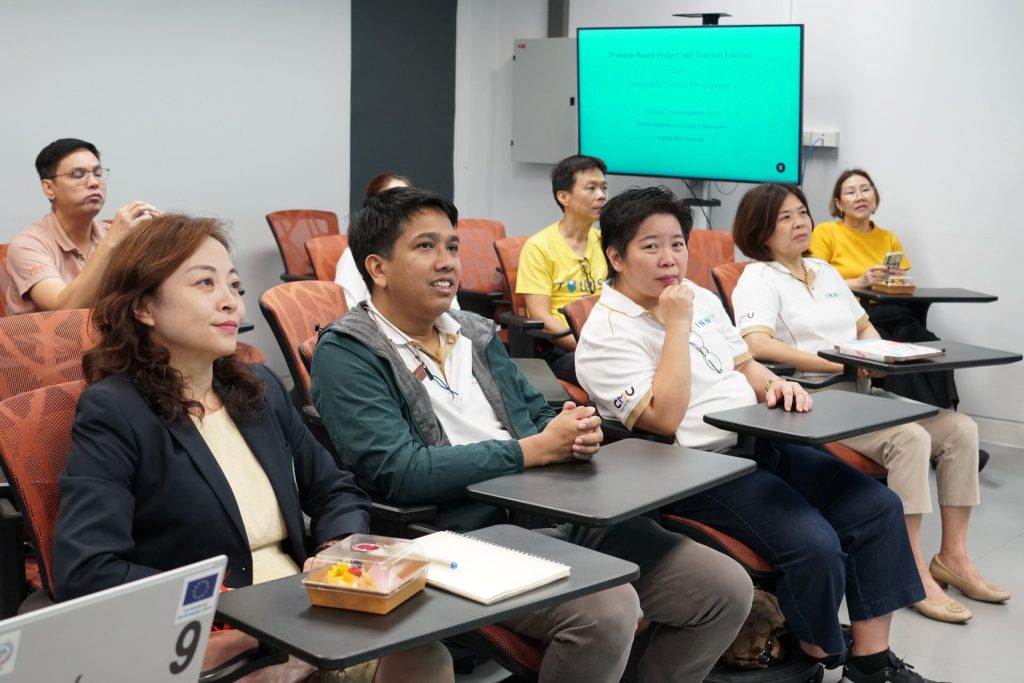
Throughout the training program, the following activities were organized:Day 1: “Problem-Based Project and Tourism Literacy for Sustainable Tourism Development,” The session was conducted by Assistant Professor Dr. Yuthasak Chatkaewnapanon, Head of the Department of Tourism, Faculty of Humanities. It focused on presenting fundamental frameworks in tourism for curriculum development aligned with learner skills and needs, and on developing a strategic perspective for sustainable tourism advancement.
Day 2: “Community-Based Learning (CBL),” led by Assistant Professor Dr. Pattaraporn Khuwuthyakorn from the College of Arts, Media and Technology. The session presented approaches to integrating education with community engagement, encouraging learners to actively engage with real communities to better understand local problems, environments, cultures, and needs. It emphasized fostering academic and neccesory skills along with social responsibility. The case study “Kheaw Chom Mueang” involved a tram tour exploring historical sites in Chiang Mai’s old city, in collaboration with the non-profit organization “Chiang Mai Network” with concept “Greenery – Beauty – Scent”
Day 3: Development on New Curricular based on the UBC Approach and Minimizing Courses Redundancy though the Application Intelligence Tools,” led by Assistant Professor Dr. Orawit Thinnukool from the College of Arts, Media and Technology. The focus was on analyzing market needs to develop modern curricula aligned with the University-Business Cooperation Mechanism (UBC Mechanism), leveraging data and modern tools to ensure relevance to industry demands. It also covered the use of AI tools to reduce course content redundancy. This session also provided a platform for academic staff to share and exchange experiences on curriculum development.
Day 4: “Knowledge-Centric Learning Environment-Based,” led by Assistant Professor Dr. Achara Khamaksorn from the College of Arts, Media and Technology. This session focused on designing learning environments that encourage knowledge sharing and creation in the context of tourism. The instructor took on the role of a facilitator, emphasizing the design of learning processes over direct content delivery. Participants engaged in a hands-on workshop using the KLE Canvas tool to collaboratively design effective learning environments.
Day 5: “Workshop: Fostering Collaborative Mindset towards Sustainable Development Goals with the SDGs 2030 Game,” led by Associate Professor Dr. Prathana Jaiphong from the Faculty of Science. The final day featured the SDGs 2030 board game, a simulation designed to help participants understand the 17 Sustainable Development Goals set by the United Nations. Through this simulated environment, participants experienced and realize the importance of collaboration and balanced resource management, particularly as they relate to sustainable tourism, digital skills, green skills, and the soft skills essential for the modern workforce.
Throughout the 5-day seminar, participants had significant opportunities to learn from experts, share experiences with networks both inside and outside the university, and engage in hands-on activities that integrated both theory and practice. They developed new concepts and skills that they could apply in their teaching. Participants also gained insights into ways to improve and tailor course content to meet real-world needs, and many were inspired to further expand their knowledge in a structured and impactful way.
Moving forward, the INNO4Tourism project will launch the newly developed curricula on Sustainable Tourism, which are co-developed by CMU academic staff and three leading universities in Southeast Asia within the consortium, to share and advance further knowledge for future teaching and learning.
